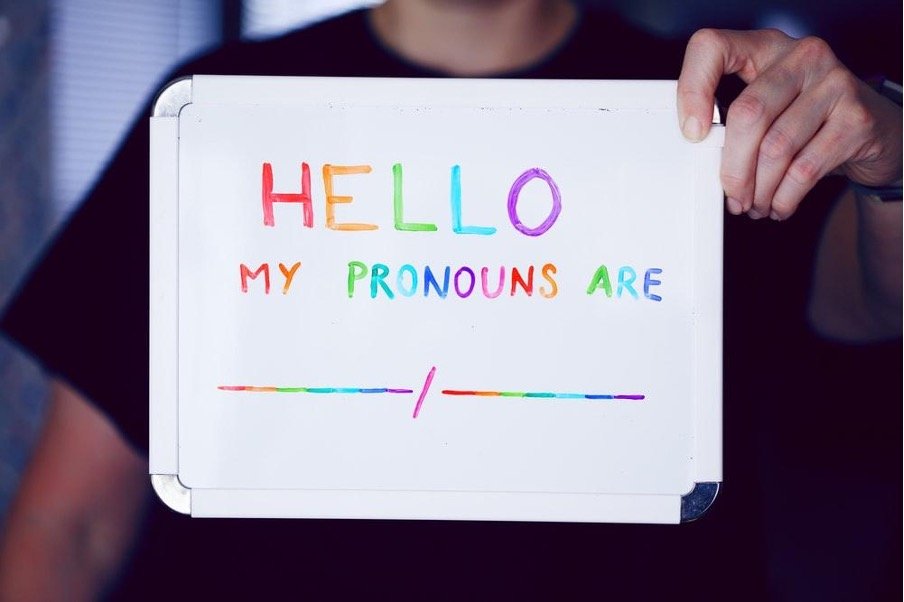
Your pocket guide to functioning like a normal person in our brave new world.
When it comes to being a part of the transgender community, there are a number of ways any single person can feel comfortable identifying or expressing their own gender. So it’s always best to ask and pay close attention to what a person tells you, as just knowing that someone is trans doesn’t explain their specific journey or feelings. It’s also important to remember not to press them for any information they don’t feel comfortable giving you. Just like you feel protective of your own genitals and identity, most of the transgender community feel the same way. It seems ridiculous to say it, but the reality is— they are people, exactly the same as you, and deserve all the respect you would want to receive, or feel inclined to give anyone else.
Even in some circumstances where sex workers or performers will prefer to refer to their services as “Shemale porn videos” or “shemale sex work”, it doesn’t mean you should use that same term with every other trans woman you meet. Oftentimes, it’s difficult to tell trans females apart from cisgender females (or trans men from cisgender men), and unless you plan on sleeping with that person (or plan on providing medical care), it’s never okay to ask someone about their genitals. In short— don’t be a jerk. Listen to what people tell you is important to them, and if it’s not hurting you, follow their lead. Because kindness costs nothing, and this little guide is free.
Labels: Love Them, Hate Them, Get Them Right
Misgendering, or intentionally mislabeling someone’s gender by using the wrong pronouns is fairly detestable. However, sometimes as humans we make mistakes. Which is perfectly okay. The transgender community will happily field most genuine questions you may have for them, but sometimes it’s a whole lot easier (for them and for yourself) to do a bit of your own research. Ensuring that the next time you run into an unfamiliar situation, you’ll be able to handle it with grace and respect.
Perhaps the easiest way to figure out which pronouns or labels a person uses is to simply listen to them and follow their lead. If they give you a name, or their pronouns, make sure to stick with those. If you’re not quite sure, it’s perfectly okay to ask. Sometimes it can help to work it into the conversation early by having your own preferred pronouns at the ready. Things like “Hey! My name is Mike, I use he/him. Nice to meet you.” This automatically can prompt whomever you’re speaking with to provide their own name and pronouns. It’s also okay to ask which pronouns a person prefers, especially if they have a non-gender or vaguely gendered name.
If you do mess up— which happens, don’t be too hard on yourself— offer them a genuine apology and move on. Don’t sit and spin out, or ask them to provide you with a full on Ted Talk about their own journey. Sometimes that can be both exhausting and really invasive for people, so just allow them to tell you what they are comfortable with and do your best to approach the situation with the respect you would want to receive. Here’s some common trans terminology to get you started:
Gender Expression/Identity
Gender expression is considered the gendered outward appearance that someone displays. Whether or not they enjoy dressing “like a man” or “like a woman” can give you an idea of their gender expression. Gender identity is considered how any given person feels. Which (if any) gender they identify with.
Cisgender
Cisgender people identify with the sex that they were assigned at birth. Which means that a person with XY chromosomes, a penis and testes, feels and identifies as being a man. Same situation for our XX, vulva packing, women.
Gender Nonconforming
When gender expression doesn’t seem to fit easily into either male or female traditional models.
Gender Dysphoria
A medically diagnosable type of distress or discomfort that many trans people can feel towards the mismatch of sex and gender. Being born one sex, but not feeling at home in that gender can cause huge amounts of anxiety and depression, but is not a mental illness in itself, which is why medical professionals strive to help allieviate the emotional turmoil of this state.
Gender Fluidity
The idea that someone can readily identify as either (or no) sex. That their gender identity and expression can fluidly fluctuate between many different traditional gender states.
Non-Binary
A person who feels neither female nor male, not being comfortable identifying with either sex— in expression, identity, or both.
Genderqueer
Genderqueer is a term that can describe someone who doesn’t feel exactly at home in any of these labels, or within any gender or sex designation. Sometimes this term can be used interchangeable with non-binary or gender nonconforming, but is often used to describe something that exists outside of the binary and non-binary labels.
Intersex
This is an umbrella term for those individuals that were born with both sex characteristics and gonads/genitals. Or anatomy that doesn’t fit within the confines of what defines female or male sexual organs.
Trans/Transgender
Transgender, or “trans” for short, can describe a person’s gender expression, or their gender identity. This is another umbrella term that is used to describe anyone who doesn’t feel at home with the sex that they were assigned at birth. Whether or not this is expressed or identified with.



